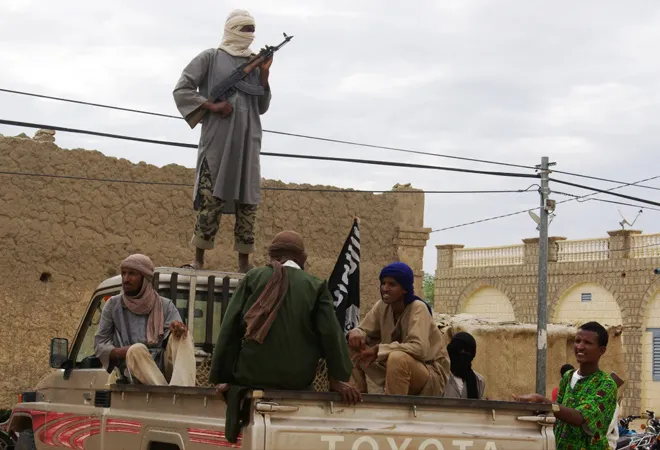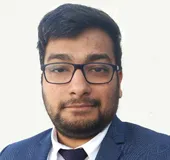
The Sahel region in Africa, ning the area from Senegal to Eritrea, has long faced severe and complex security and humanitarian crises. Over half of the population in this region lives below the poverty line and many countries face the threat of terrorism and organised crime. Increasingly, the Sahel has emerged as a hotbed of Islamist extremists with organisations like the Islamic State of the Greater Sahara (ISGS), Macina Liberation Front (FLM), and Jama’at Nusrat ul-Islam wa al-Muslimin (JNIM) conducting violent attacks.
The most visible and worrying trend in the region is the escalating rates of violence each consecutive year. In 2021 alone, there were an estimated 4,839 fatalities linked to such extremist violence in the Sahel, marking a
70-percent increase from the previous years. These developments have led to a
significant shift of terrorism away from the Middle East to the African Sahel, with nearly half of the global death toll from terror activities coming from here. The Sahel has observed a
2,000-percent growth in Islamist terrorism over the past 16 years. Worried by these developments, New Delhi through the United Nations (UN) has also offered a six-point plan for ‘
silencing the guns’ in the continent.
Heavy civilian casualties and allegations of human rights violations by security forces undermined regional and national efforts.
To combat these growing cyclical bouts of violence and root out extremists, regional countries have looked to enlist the help of foreign partners mainly in the form of military aid. For example,
in 2012, Mali requested aid from France when militants encroached on the country’s capital, Bamako. Within weeks, the French forces conducted Operation Serval and successfully recaptured the central northern cities of Gao and Timbuktu. This operation was replaced in August 2014 by France’s anti-insurgent operation, Operation Barkhane, which
formally ended on 9 November 2022.
Enter France with Operation Barkhane
In the initial years,
Operation Barkhane was viewed as a success. The French forces were able to employ their specialised air and ground technologies and drive out militants from key places. France, with the support of European partners, was able to increase its footprint across the Sahel and established two additional permanent bases in N’Djamena, Chad and Niamey, Niger. In 2017, France along with Burkina Faso, Niger, Mali, Mauritania, and Chad established the
G5 Sahel Force, which was a five-thousand-troop-strong counterterrorism force. Despite having an expanded mandate to cross borders, these efforts eventually failed to garner local support. Heavy civilian casualties and allegations of human rights violations by security forces undermined regional and national efforts.
France’s ultimate failure to attain its stated objectives was attributed to a combination of structural features like operational errors, political mistakes, and, most consequentially, a misunderstanding of local conflict dynamics. Soon, the French operations in the region started to be seen as President Emmanuel Macron’s very own
Afghanistan moment.
France’s approach towards Mali tended to be overtly militarised, based on an incorrect assumption that terrorist organisations are the root cause of instability in the Sahel rather than viewing them as sociologically complex insurgencies. On top of that, despite France’s rhetoric of democratisation and insistence on the importance of state-building, its military-centric approach towards the conflict ensured that it failed to address Mali’s governance crisis. In the operational sense as well, France made
critical mistakes when it partially renewed its partnership with the National Movement for the Liberation of Azawad (MNLA), a Tuareg secessionist group, which was the primary initiator of the rebellion in 2012 that eventually led to jihadist control over most of northern Mali. Additionally, the French military’s association with non-state armed groups like the
Tuareg and Daoussahak militias, who were accused of committing serious atrocities against the Fulani communities, facilitated this kind of ethnic violence.
France’s approach towards Mali tended to be overtly militarised, based on an incorrect assumption that terrorist organisations are the root cause of instability in the Sahel rather than viewing them as sociologically complex insurgencies.
While these developments were unfolding, anti-French sentiment across the Sahel reached a record high, primarily owing to France’s inability to tackle the security crisis. Street protests became a very regular occurrence. The coups in
August 2020 and
May 2021 in Mali also deposed leaders, that were, in some capacity, cooperating with French efforts. The Malian junta, to this day, continues to draw on popular grievances to maintain its legitimacy. Malian leaders adopted a brand of confrontational diplomacy by branding the
French approach in the Sahel as neocolonialist, paternalistic, patronising, and condescending. The breakdown in relations between Bamako and Paris occurred within months.
Not only did Bamako expel the French ambassador in January 2022 but also decided to withdraw from the G5 Sahel task force in May 2022.
Enter Russia and the Wagner Group
One of the earliest visible signs of growing cooperation between
Mali and Russia came in September 2021 when Moscow delivered military hardware to Bamako, including helicopters, weapons, and ammunition. Rumours began to circulate that Mali had signed a contract with the Wagner Group, Moscow’s most prolific private military company. Although Malian authorities deny it, their presence is no longer in doubt. In exchange for training local armed forces and providing security for senior Malian officials, the Wagner Group’s mercenaries were
tasked with pushing access to local natural resources. Although this partnership with Moscow has allowed Mali to acquire military equipment and carry out operations, results have been slow.
It has been over a year since Bamako decided to shift its preferred military partner from Paris to Moscow. Yet it has not been able to achieve its central aim of driving out jihadists. However, even a decade of Western intervention to counter jihadist expansion could not achieve the removal of jihadists. Today, Mali finds itself being caught in a vice between major powers. Mali’s decision to shift its strategic alliance could deprive them of crucial Western and regional allies’ support. For now, Mali’s transnational authorities have built a political support base and garnered local popularity through their strategic repositioning and rapprochement with Russia. However, this support could easily erode in the long run if the complex security situation remains unaddressed.
Geopolitics, conflicting powers, and Islamist terror groups
One of the core requirements for the success of non-state militant groups is political instability and weakness of states. From Afghanistan to Syria, the likes of Al Qaeda, the so-called Islamic State (also known as ISIS or Daesh in Arabic), amongst others have thrived on the back of weak states owing to political, cultural, theological, and societal factors. Local conflicts have offered an opportune environment for these groups and ideologies to gain ground.
Mali’s transnational authorities have built a political support base and garnered local popularity through their strategic repositioning and rapprochement with Russia.
Islamist groups that
thrive largely on local intricacies have successfully piggybacked on the brand value of larger transnational jihadis corporations such as Al Qaeda and ISIS. Groups in the region—from Al Qaeda-aligned Al Shabaab in Somalia to the ISIS-aligned Allied Democratic Forces (or ISIS-DRC) in the Democratic Republic of the Congo (DRC)—have used the larger Islamist groups to attract attention, to raise funding more easily, and to develop a ‘two-way’ cooperative model in which local affiliates gain from AQ and ISIS’s global mandate while the latter gain from the local affiliate’s capacity to mobilise ideology and operationalise tactics that translate into challenging state institutions, governments, and militaries alike. This remains different from AQ and ISIS practices in places such as the Middle East, but are somewhat like those in Afghanistan, where the ISIS brand co-opted militants and localised insurgencies that operate in the political and ethnic crevasses of the Af-Pak construct. However, the issue is not only strategic and tactical in places such as the Sahel, but also economic, especially in key centres of the continent such as South Africa, where members of ISIS have been
sanctioned for using the formalised economy to raise funds for the group’s activities in the region.
International response to this shift in the epicentre of global terrorism has been timid, largely due to increased unpopularity of foreign interventions by Western powers in the post-9/11 ‘War on Terror’ era, and by the very public failures in places such as Afghanistan, where the
Taliban ultimately came back to power in 2021. An African-led response would still require the capacities and capabilities of the international community; however, this is becoming more unlikely as
big power competition between the US and China and the fracture of the West’s relations with Russia undo years’ worth of diplomacy that led to a level of bi-partisan success in consensus building against terrorism.
However, the issue is not only strategic and tactical in places such as the Sahel, but also economic, especially in key centres of the continent such as South Africa, where members of ISIS have been sanctioned for using the formalised economy to raise funds for the group’s activities in the region.
Conclusion
As India
expands its diplomatic presence across Africa, countering terrorism should become an increasingly important area of cooperation. However, implementation of this will not be easy as New Delhi will have to make sure it is dealing with governments that have no direct relations with Islamist terror groups or have aligned with them to seize power, specifically when it comes to institutional cooperation such as training and arming militaries and police of certain states. This will be easier said than done in the coming time as international powers look to benefit their own interests while local leaders search for power, even if that means pandering to local insurgencies. The African Sahel region demands the attention of the global community on countering terrorism, and it is also in India’s interest to keep this as a front-running issue of cooperation with partners in the region and beyond.
The views expressed above belong to the author(s). ORF research and analyses now available on Telegram! Click here to access our curated content — blogs, longforms and interviews.



 The Sahel region in Africa, ning the area from Senegal to Eritrea, has long faced severe and complex security and humanitarian crises. Over half of the population in this region lives below the poverty line and many countries face the threat of terrorism and organised crime. Increasingly, the Sahel has emerged as a hotbed of Islamist extremists with organisations like the Islamic State of the Greater Sahara (ISGS), Macina Liberation Front (FLM), and Jama’at Nusrat ul-Islam wa al-Muslimin (JNIM) conducting violent attacks.
The most visible and worrying trend in the region is the escalating rates of violence each consecutive year. In 2021 alone, there were an estimated 4,839 fatalities linked to such extremist violence in the Sahel, marking a
The Sahel region in Africa, ning the area from Senegal to Eritrea, has long faced severe and complex security and humanitarian crises. Over half of the population in this region lives below the poverty line and many countries face the threat of terrorism and organised crime. Increasingly, the Sahel has emerged as a hotbed of Islamist extremists with organisations like the Islamic State of the Greater Sahara (ISGS), Macina Liberation Front (FLM), and Jama’at Nusrat ul-Islam wa al-Muslimin (JNIM) conducting violent attacks.
The most visible and worrying trend in the region is the escalating rates of violence each consecutive year. In 2021 alone, there were an estimated 4,839 fatalities linked to such extremist violence in the Sahel, marking a  PREV
PREV



